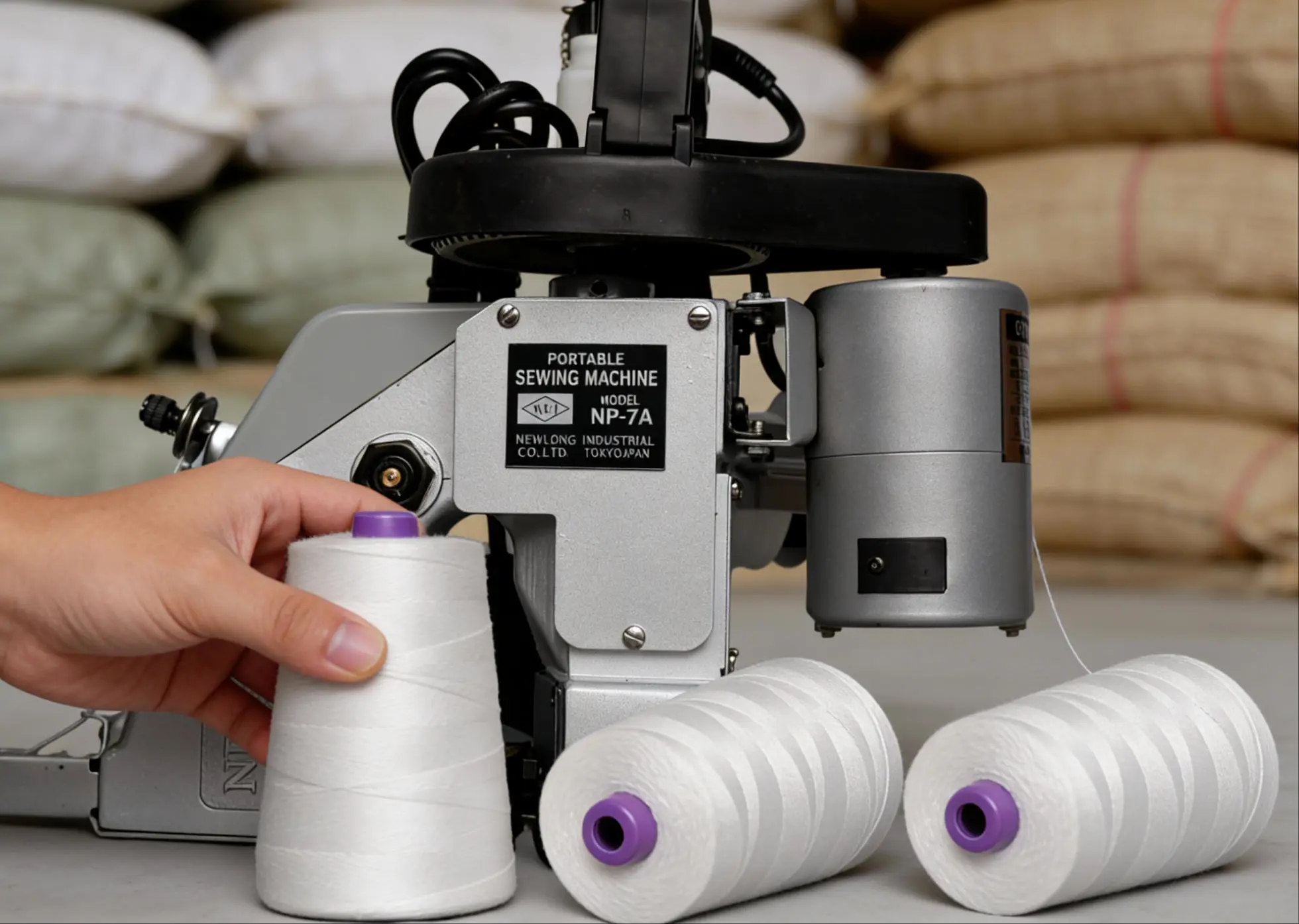
Как определяется и выбирается прядильная полиэфирная нить для закрытия мешков?
HПредлагаем вашему вниманию статью о том, как в разных отраслях промышленности определяются и выбираются нити для зашивания пакетов из пряденого полиэстера, и как правильный выбор количества, слоя и модели (NE12/4, NE10/3, NE20/6, NE12/5 и т.д.) может напрямую повысить эффективность вашей упаковочной линии. По всем вопросам обращайтесь в отдел продаж компании Henan Deman Packing Co.
Нить из пряденого полиэстера сочетает в себе высокую прочность на разрыв, устойчивость к истиранию и низкое удлинение, что очень важно для высокоскоростных машин для зашивания мешков. Но "один размер подходит всем" не применим: неправильное количество или слой приводит к чрезмерным обрывам, простоям и износу машины. особенно нравится наша компания, предлагающая различные виды ниток для пошива сумок. стоит внимательно прочитать статью.

NE Count (английский счет хлопка): Указывает, сколько отрезков длиной 840 ярдов весят один фунт, за одного. Более высокий NE (например, NE20) означает более тонкую пряжу; более низкий NE (например, NE10) означает более грубую.
Пли: Количество нитей, скрученных вместе. Например, NE12/4 = четыре нити NE12 single скручены в одну нить.
Результирующая толщина и прочность:
Толщина ∝ (слой × 1/нед.)
Сила ∝ (слой × прочность однониточной пряжи)
Таким образом, NE20/6 одновременно является более тонким (NE20) и более многослойная (6-слойная), чем NE10/3.
Различная толщина
Различное усилие на разрыв
| Промышленность | Стандартный вес сумки | Скорость машины | Рекомендуемая модель резьбы | Ключевые преимущества |
|---|---|---|---|---|
| Мука, специи, злаки | 2-10 кг | 100-200 мешков/мин | NE10/3 или NE12/3 | Тонкая резьба снижает трение при подаче; достаточная прочность для небольших нагрузок. |
| Корма для животных, семена | 10-25 кг | 150-250 мешков/мин | NE12/4 или NE12/3 | Сбалансированная прочность; минимальное количество разрывов на средней скорости. |
| Удобрения, химикаты | 20-50 кг | 150-300 мешков/мин | NE12/5 или NE12/4 | Усиленный слой для больших нагрузок; устойчив к истиранию гранулированного содержимого. |
| Цемент, минералы | 25-50 кг | 200-300 мешков/мин | NE12/4 NE10/4 или NE102/5 | Максимальная прочность на разрыв; выдерживает скачки машинного напряжения. |
| Продукты питания и фармацевтика | 1-25 кг | 80-200 мешков/мин | NE10/3 (пищевая отделка) | Соответствует стандартам FDA/EU по контакту с пищевыми продуктами; тонкое, аккуратное уплотнение. |
Вес и материал сумки
Для более тяжелых и плотных продуктов (цемент, удобрения) требуются более высокослойные нити (например, 5-6 слоев).
Легкие грузы (мука, сахар) хорошо пропускают нити в 3-4 слоя.
Скорость линии и тип машины
Для высоких скоростей (>200 мешков/мин) требуется как высокая прочность, так и равномерный диаметр, чтобы избежать замятий при трении.
Убедитесь в совместимости с вашей машиной для зашивания мешков (FISCHBEIN, NEWLONG, UNION SPECIAL и т.д.), особенно в уровне смазки и направлении закручивания.
Экологические факторы
Влажность, температура и пыль могут влиять на удлинение и статичность резьбы. Выберите покрытие для скручивания/смазки, оптимальное для вашего объекта.
Потребности в регулировании и обеспечении безопасности пищевых продуктов
Для прямого или косвенного контакта с пищевыми продуктами укажите соответствие требованиям FDA CFR Title 21 и EU 10/2011 (часто поставляются с отделкой NE10/3 для пищевых продуктов).
Компромисс между стоимостью и нормой расхода
Более тонкие нити стоят дешевле за метр, но могут чаще ломаться при больших нагрузках.
Более толстые, многократно увеличенные нити стоят дороже, но обеспечивают меньшее количество остановок, что значительно снижает общую стоимость запечатанного пакета.
Сократите время простоя: Соответствие прочности нити нагрузке мешка сокращает количество случаев обрыва до 70%.
Минимизация технического обслуживания: Равномерный диаметр и оптимизированная смазка снижают износ натяжителей и режущих ножей.
Увеличьте пропускную способность: Нить, которая плавно подается на высоких оборотах, позволяет вашей машине работать на максимальной номинальной скорости - никаких вынужденных замедлений.
Низкий процент брака: Последовательное формирование стежков предотвращает расхождение стежков или недоуплотнение, что приводит к браку пакетов.
Заключение
Выбор подходящей закрывающей нити из пряденого полиэстера - это баланс между прочностью на разрыв, толщиной, совместимостью с машинами и стоимостью. Понимая количество NE и систему слоев, а также подбирая такие модели, как NE10/3, NE12/4, NE12/5, NE10/4, NE12/6 NE20/7 или NE20/6, в соответствии с потребностями вашей отрасли, вы добьетесь меньшего количества обрывов, более быстрого времени цикла и снижения общей стоимости владения. Правильный выбор резьбы - это не мелочь, а ключевой рычаг, позволяющий максимально повысить производительность и рентабельность всей упаковочной линии.





